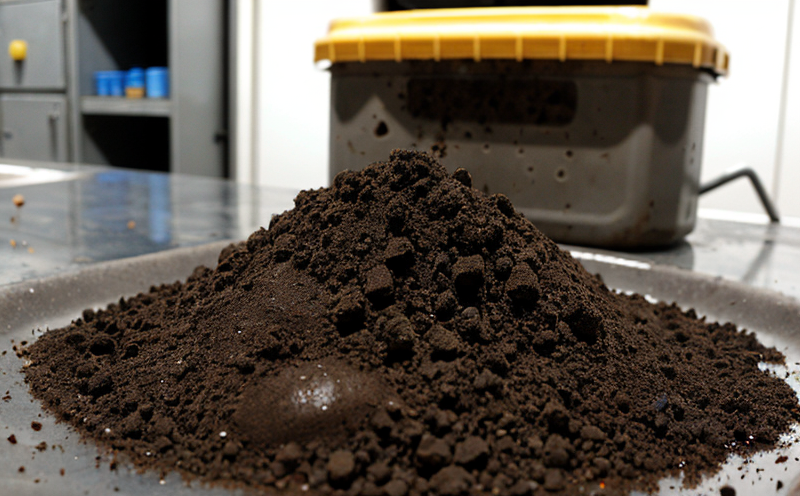Biodegradable Plastic Residual Compound Testing
Biodegradable plastics have garnered significant attention in recent years as a sustainable alternative to traditional petroleum-based plastics. However, the development and use of these materials come with specific challenges related to their environmental impact. One critical aspect is ensuring that biodegradable plastic products do not leave harmful residual compounds behind after degradation processes. This testing service focuses on identifying and quantifying any residual compounds in biodegradable plastics to ensure compliance with environmental standards.
Residual compounds can include additives, fillers, or other components added during the production of these materials. These residues are often introduced to enhance performance properties such as flexibility, durability, or resistance to certain chemicals and temperatures. Understanding what remains in biodegradable plastics is crucial for ensuring that they meet regulatory requirements and do not pose risks to the environment.
The testing process involves several key steps: sample preparation, analysis using advanced analytical techniques like High-Performance Liquid Chromatography (HPLC), Gas Chromatography-Mass Spectrometry (GC-MS), or Fourier Transform Infrared Spectroscopy (FTIR). Each method is chosen based on the specific type of compounds expected in the plastic matrix. After thorough examination, results are compared against international standards such as ASTM D884 and ISO 17539 to determine compliance.
Our laboratory specializes in this service by providing accurate, reliable data that helps manufacturers validate their products' environmental safety. This testing ensures that biodegradable plastics decompose into harmless substances without leaving harmful residues behind. It also supports the development of more sustainable materials and helps companies meet growing demands for eco-friendly alternatives.
By offering this specialized service, we contribute to reducing pollution risks associated with improper disposal or incineration of biodegradable plastics. This is particularly important given increasing public awareness about plastic waste management issues globally. Through rigorous testing protocols, our team aims to promote responsible innovation within the industry while adhering strictly to regulatory frameworks.
- Ensures compliance with international standards (ASTM D884, ISO 17539).
- Provides accurate identification and quantification of residual compounds.
- Supports sustainable product development through reliable testing data.
- Aids in meeting regulatory requirements for biodegradable plastic products.
We employ state-of-the-art laboratory equipment and experienced professionals who understand the complexities involved in analyzing complex polymer matrices. Our team works closely with clients throughout every stage of the testing process, from initial consultation to final report delivery, ensuring that all needs are addressed efficiently and effectively.
Eurolab Advantages
At Eurolab, we pride ourselves on delivering exceptional services tailored specifically for our clients’ unique needs. When it comes to biodegradable plastic residual compound testing, here are some key advantages that set us apart:
- Comprehensive Understanding: Our team comprises experts with extensive knowledge in polymer science and environmental chemistry who can provide insights beyond basic compliance.
- State-of-the-Art Facilities: Equipped with cutting-edge analytical instruments like HPLC, GC-MS, FTIR, we ensure precise results.
- Custom Solutions: We offer customized testing packages designed specifically for your specific requirements and goals.
- Accurate Reporting: All findings are documented meticulously following best practices outlined by relevant standards organizations like ASTM and ISO.
Why Choose This Test
Choosing biodegradable plastic residual compound testing is essential for several reasons:
- To ensure compliance with environmental regulations.
- To protect your brand reputation by demonstrating a commitment to sustainability.
- To aid in the development of safer, more effective products.
- To facilitate market entry into regions where stringent biodegradability standards apply.
International Acceptance and Recognition
Biodegradable plastic residual compound testing is recognized internationally as a vital component in ensuring the safety and effectiveness of these materials. Regulatory bodies worldwide have implemented various guidelines to govern how biodegradable plastics should be produced, tested, and disposed of responsibly.
For instance, organizations like ASTM International (formerly known as American Society for Testing and Materials) provide comprehensive standards such as ASTM D884-19 which covers the procedure for determining the biodegradability of solid waste. Similarly, ISO 17539 specifies methods for assessing composting performance of plastics.
These international bodies play a crucial role in standardizing testing procedures and setting benchmarks that must be met before any product can claim to be truly biodegradable. By adhering strictly to these standards during our testing process, we ensure that your products meet global expectations regarding environmental responsibility.





